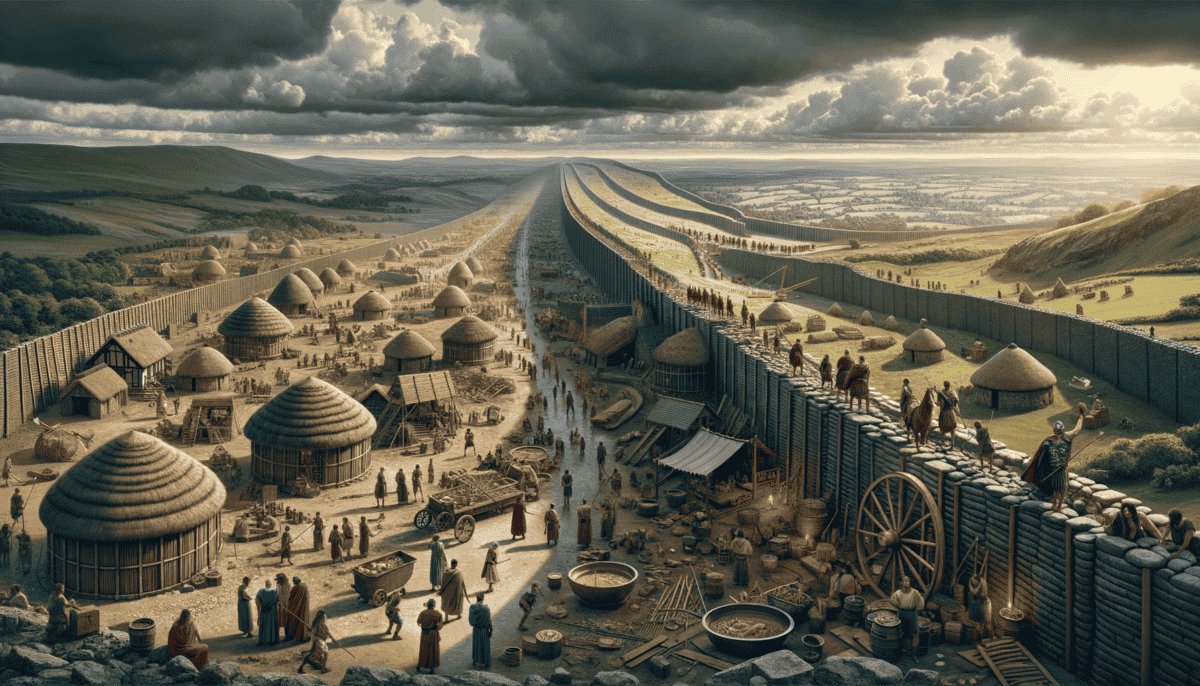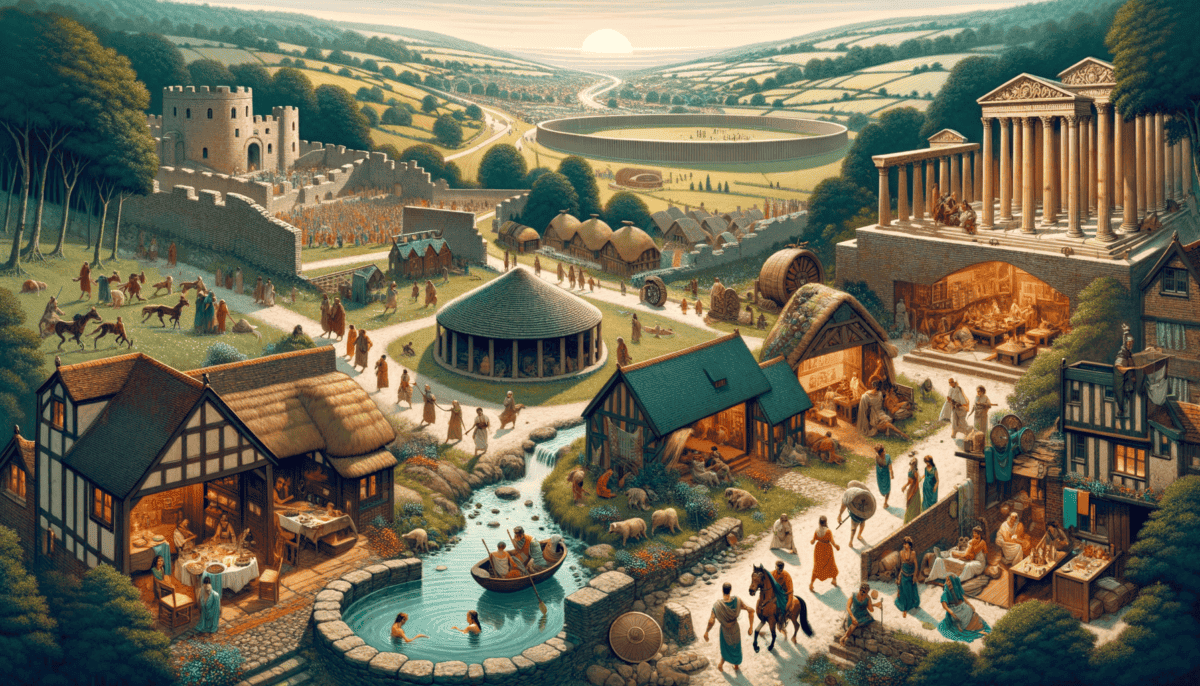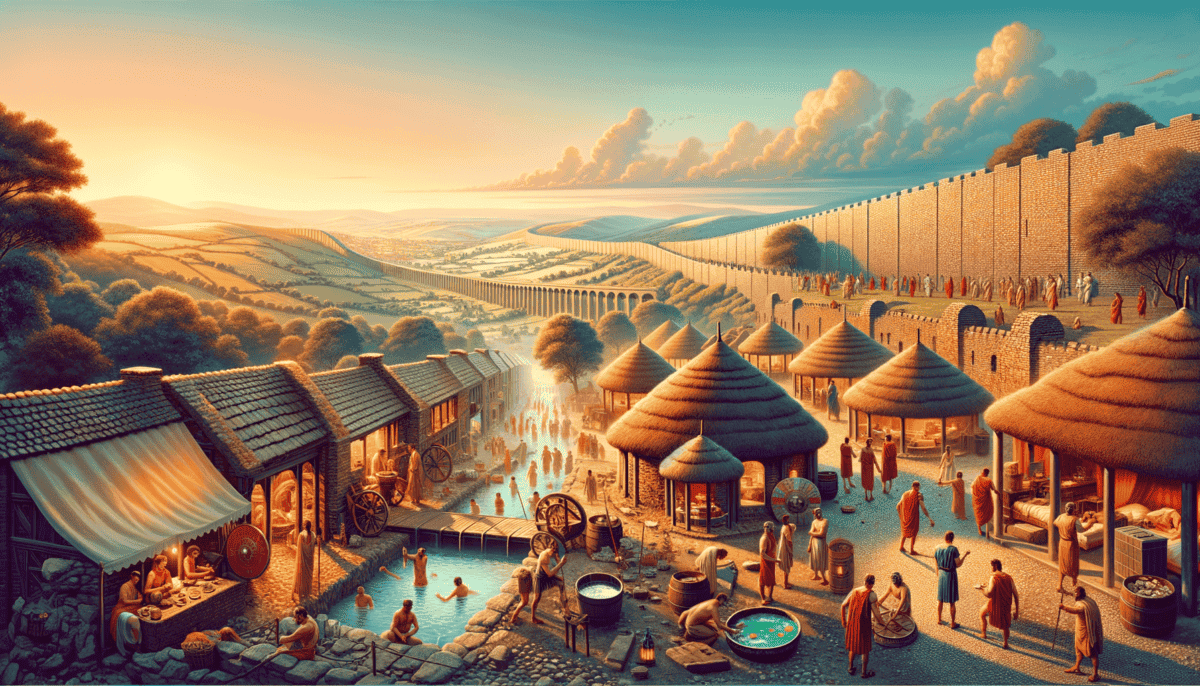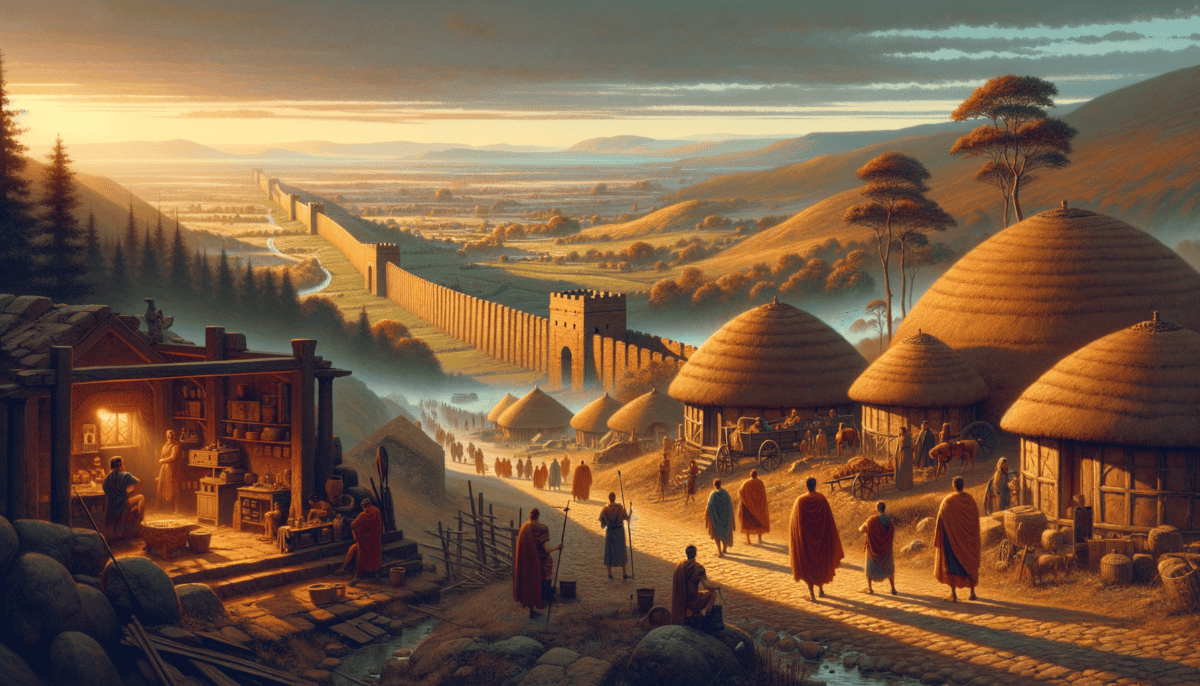The Arrival
Marcus wiped sweat from his brow as the wooden ship rocked beneath his feet. At just eighteen years old, he was the youngest soldier in his unit. The salty sea air whipped around him as Britain's misty shores came into view.
"Land ahead!" shouted the captain.
Marcus gripped the ship's rail tighter, his stomach doing flips. This was his first time away from Rome. Everything looked different here – the gray skies, the thick forests, the rocky beaches.
"Nervous, young one?" asked Flavius, an older soldier with kind eyes. He put a reassuring hand on Marcus's shoulder.
"A little," Marcus admitted. "I've never been so far from home."
The ship scraped against the pebbly shore. Marcus took a deep breath and adjusted his red soldier's cape. His commander's voice boomed across the deck:
"Remember men, we're here to bring Roman ways to these lands. Be strong but fair!"
As Marcus stepped onto British soil for the first time, he saw movement in the nearby woods. Local Celtic people watched from the trees, their faces painted with blue patterns. Some held spears, while others simply looked curious.
"Hello!" called out a Celtic boy about Marcus's age. He wore a checkered cloak and spoke broken Latin. "I am Caractacus."
Marcus smiled and waved back, though his commander frowned at this friendly exchange. The other Roman soldiers began unloading their supplies – tents, weapons, and tools for building.
Everything was so green here, Marcus thought. The grass, the trees, even the hills seemed to glow with an emerald light so different from Rome's dusty streets.
That night, as Marcus sat by the campfire, he wrote in his diary:
Dear Father,
Britain is strange but beautiful. The people here aren’t what I expected. They’re curious about us, just as we are about them. Though some look at us with fear, others – like a boy I met named Caractacus – seem friendly. I hope we can learn from each other.
A Celtic melody drifted through the trees, mixing with the Roman soldiers' evening songs. Marcus closed his eyes and listened to the two tunes blend together. Maybe, he thought, this new land wouldn't feel so foreign after all.
As he drifted off to sleep in his tent, Marcus wondered what adventures awaited him in this mysterious island at the edge of the Roman world. The sound of waves crashed against the shore, a constant reminder of just how far he was from home. But somehow, that didn't seem quite so scary anymore.
Tomorrow would bring new challenges – setting up camp, meeting more local people, and beginning their mission. But for now, Marcus was just happy to have made it safely across the sea. And maybe, just maybe, he had already made his first British friend.
Building an Empire
The morning sun peeked through the fog as Marcus lifted another heavy stone. His muscles ached from weeks of building Hadrian’s Wall. ️
“Careful with that one!” called Flavius. “We want this wall to last forever!”
Marcus smiled, remembering how different everything had been just a few months ago. Now, he worked side by side with British workers, learning their ways and teaching them Roman building tricks.
Caractacus, his Celtic friend, walked up with a water jug. “Water break!” he announced in his improving Latin. “The sky looks angry today.”
Marcus looked up at the dark clouds rolling in. The British weather was so different from Rome’s sunny skies. He had learned to always keep his warm cloak nearby.
The wall grew taller each day, stone by stone, connecting east to west across the wild northern lands of Britain.
“Why do Romans love straight lines so much?” Caractacus asked, watching the wall take shape.
“They help us build things strong,” Marcus explained. “Like the roads we’re making. They’ll connect all of Britain!”
The British workers had taught them too – which local stones worked best, how to stay warm in the rain, and which plants could heal cuts and scrapes. Marcus wrote about it in his diary:
Today I learned that mixing Roman cement with local limestone makes our walls even stronger. The Britons know so much about their land. Together, we're building something amazing.
As rain began to fall, everyone hurried to cover the fresh mortar. Marcus helped Caractacus stretch a leather tarp over their work. Their hands were equally callused now from the hard work.
“Look!” shouted someone. Through the rain, they could see colorful tents appearing in the valley. More British families were setting up homes near the wall, bringing food and supplies to trade.
That evening, Roman soldiers and British workers shared a feast. Someone brought out a lyre, and soon both Roman and Celtic songs filled the air. Marcus taught Caractacus a Roman game with dice, while Caractacus showed him how to weave patterns like the ones on British cloaks.
“Your wall will change everything,” Caractacus said thoughtfully.
“Our wall,” Marcus corrected him with a smile. “We’re building it together.”
As Marcus fell asleep that night, he could hear the wind whistling through the scaffolding. The wall was more than just stones and mortar – it was bringing people together in ways he never expected. Tomorrow would bring more work, more stories, and more friendship between two very different peoples learning to share one land.
A Queen’s Fury
Marcus stood frozen as flames lit up the night sky. The city of Camulodunum burned before him. Queen Boudicca’s warriors had struck with the fury of a storm.
“They took everything from her,” whispered Caractacus, who had rushed to warn Marcus. “The Romans broke their promise to her husband, the king.”
Marcus watched as people ran through the streets. The queen’s red hair glowed like fire in the torchlight. She stood tall in her chariot, her voice carrying over the chaos:
“We fight for our freedom! For our children! For our homes!”
The memory of building the wall with his British friends felt far away now. Marcus’s heart hurt as he saw both Romans and Britons suffering.
The night sky glowed orange and red, while war cries echoed through the burning streets.
“What should we do?” asked young Rufus, another Roman soldier. His hands shook as he held his shield.
Marcus made a quick choice. “We help anyone who needs it – Roman or Briton. Get the children to safety first!”
They worked through the night, helping families escape the fires. Marcus saw things he would never forget:
- Brave British warriors fighting for their freedom
- Roman soldiers protecting innocent people
- Children from both sides helping each other
- Neighbors saving neighbors, no matter where they came from
Caractacus stayed by Marcus’s side. “You’re different from the others,” he said softly. “You see us as people, not just conquered lands.”
The flames danced in Marcus’s tears as he wrote in his diary that night: “War makes everyone lose. There must be a better way.”
Days later, Marcus heard that Queen Boudicca’s army had grown huge. More tribes joined her fight. They burned London next, then marched toward other Roman cities.
“Why didn’t we listen?” Marcus asked the night sky. “We should have treated them fairly.”
The rebellion changed everything. Marcus saw how treating people badly led to anger and fighting. He wondered if Romans and Britons would ever trust each other again.
Caractacus touched his shoulder. “Some of us still believe in peace,” he said. “We remember how we worked together on the wall.”
As dawn broke over the burned city, Marcus made a promise to himself. He would work harder than ever to help Romans and Britons understand each other. Maybe then, they could build something better than walls – they could build friendship.
The ashes settled, but the story of Boudicca’s brave fight would live forever. And Marcus learned that true strength isn’t in conquering others – it’s in learning to live together with respect.
Two Worlds Become One
The morning sun peeked through the mist as Marcus walked through the marketplace. Things had changed since Boudicca’s rebellion. Romans and Britons now mixed together, sharing food and stories.
“Try this honey cake,” called Flora, a British baker. “Made with Roman wheat and British honey!” Her smile was warm as she handed Marcus a piece.
Marcus saw his friend Caractacus teaching Roman children how to play British games. The children laughed as they rolled wooden hoops down the street.
“Look what I learned!” shouted little Julia, a Roman girl. She showed off her new British-style bracelet made of colored beads.
The marketplace buzzed with voices speaking both Latin and British words, creating a new way of talking.
Marcus noticed more changes every day:
- British homes now had Roman-style heated floors
- Roman soldiers wore warm British wool cloaks
- Children played with toys from both cultures
- Families celebrated both Roman and British holidays
“Remember when we first met?” Caractacus asked, joining Marcus. “You thought we were just wild people who needed Roman ways.”
Marcus nodded. “And you thought all Romans were mean soldiers who only wanted to take things. We were both wrong.”
At the temple, British and Roman gods stood side by side. People prayed to both, asking for good harvests and peace.
In the evening, Marcus visited the new public baths. British herbs filled the steam room with sweet smells. Roman and British men talked and laughed together in the warm water.
“My grandson wants to be a Roman soldier,” said an old British man. “But he won’t forget our old stories. He’ll be both.”
Marcus watched as a group of children played school nearby. They wrote Latin words with British stories. Their teacher used both languages to help them learn.
“We’re making something new,” Caractacus said proudly. “Not just Roman, not just British. Something better.”
That night, at a big feast, Marcus watched Romans wearing British plaid clothes dance with Britons wearing Roman togas. The music mixed British pipes with Roman lyres.
“To our new family!” shouted Flora, raising her cup. Everyone cheered – Romans and Britons together.
As stars filled the sky, Marcus wrote in his diary about the new world they were building. He drew pictures of Roman roads leading to British villages, and British farmers using Roman tools.
The next morning, Marcus helped build a new house. It had Roman brick walls and a British thatched roof. “Just like us,” Caractacus laughed. “A bit of both makes it stronger!”
Looking at their work, Marcus smiled. The wall he helped build still stood, but now it wasn’t about keeping people apart. It was about protecting the new life they all shared together.
Life Along the Wall
The morning fog rolled over Hadrian’s Wall as Marcus made his daily patrol. After ten years in Britain, the damp air felt normal now. A group of children, both Roman and British, waved as they herded sheep nearby.
“Good morning, Marcus!” called out Lucius, a fellow soldier who had married a British woman. “Join us for breakfast? My wife made fresh bread!”
Inside their cozy home, the smell of baking filled the air. Clay pots held British herbs and Roman olive oil. On the walls hung both shields and dreamcatchers.
“The trading post is busy today,” said Elena, Lucius’s wife, serving warm bread. “Merchants from all over bring new things.”
At the busy trading post, Marcus saw:
- Roman wine traded for British wool
- Local cheese sold next to Mediterranean olives
- British hunting dogs bought by Roman officers
- Pottery made with mixed Roman and British designs
“Times have changed,” said old Callum, a British elder. “My grandson serves in the Roman army now. He sends money home to help us.”
Life along the wall wasn’t always easy, but people found ways to help each other survive and grow stronger.
Marcus visited the fort’s hospital, where British healers worked with Roman doctors. They mixed local plants with Roman medicine to make better cures.
“Remember when we wouldn’t share our healing secrets?” laughed Brigid, a British healer. “Now we save more lives working together.”
Inside the fort’s great hall, soldiers and families gathered for the evening meal. The smell of British stew mixed with Roman spices made everyone hungry.
“Tell us a story, Marcus!” called the children. They loved hearing tales of both Roman heroes and British legends.
“Once there was a brave British warrior and a clever Roman scout,” Marcus began. “They learned to trust each other and became best friends…”
Later, Marcus walked the wall’s top again. Below, farmers tended fields using both Roman plows and British farming wisdom. In the distance, smoke rose from village chimneys where families stayed warm together.
“The wall protects us all now,” said Callum, joining Marcus. “Not just Romans from Britons, but all of us from real dangers.”
At sunset, Marcus watched children play Roman ball games while wearing British-style clothes. Their laughter echoed off the ancient stones.
“We’ve built more than just a wall,” Marcus thought. “We’ve built a new way of life.”
That night, as torches lit the wall, guards called out in mixed Latin and British words. The stars shone down on a land where two peoples had learned to live as one family.
Marcus smiled as he wrote in his diary about the busy day. Tomorrow would bring new challenges, but they would face them together – Romans and Britons, united in their home along the great wall.
A New Chapter Begins
The winter wind howled across Hadrian’s Wall as Marcus gazed at the horizon. After fifteen years in Britain, it was time to say goodbye.
“I remember when you first arrived,” said Elena, wrapping a warm British wool cloak around his shoulders. “You could barely stand our cold weather!”
Little Marcus Junior, named after his godfather, tugged at his cloak. “Uncle Marcus, will you tell us one last story?”
Around the warm hearth, children gathered – some with Roman features, others with British red hair, but all part of one community. Marcus smiled and began:
“When I first came to Britain, I thought we Romans knew everything. But your grandparents taught me that wisdom comes in many forms.”
The children listened as Marcus shared memories of building the wall, fighting alongside brave British warriors, and learning to respect their ancient ways.
“Look at what we’ve created together,” Lucius said, gesturing to their village. Buildings mixed Roman stone with British wooden designs. Gardens grew both Mediterranean herbs and local plants.
- Roman roads helped British traders travel
- British farming methods fed growing towns
- Mixed families spoke both languages
- New art showed both cultures’ beauty
Old Callum hobbled forward with a gift. “For your journey home,” he said, presenting a medallion. “British silver with Roman designs – like all of us now.”
“Home isn’t just where you’re from,” Marcus said, touching the medallion. “It’s where your heart finds peace.”
Young British soldiers who had served under Marcus lined up to say farewell. Their Roman armor gleamed alongside their British tribal tattoos. ️
“We’ll protect the wall,” they promised. “And the people – all the people.”
As Marcus mounted his horse, he saw the future in the faces around him. Roman children played British games. British craftsmen built with Roman tools. Two cultures had become one family.
“Will Britain always be part of Rome?” asked little Marcus Junior.
“Rome may leave Britain’s shores,” Marcus answered wisely, “but what we built together will last forever – in your hearts, your customs, and your children’s children.”
The morning sun broke through the clouds as Marcus rode south. Behind him, Roman and British voices joined in a farewell song. The wall stood strong, not as a barrier, but as a symbol of how people could grow stronger together.
Years later, travelers would tell tales of Britain – where Roman roads led to British villages, where children spoke ancient British words mixed with Latin, and where the great wall reminded all that the greatest strength comes from unity.
And somewhere in Rome, an old soldier named Marcus would smile, touching a silver medallion, remembering how a distant post at the edge of the empire had taught him the true meaning of home. ⭐






